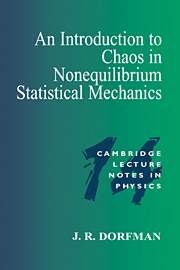Book contents
- Frontmatter
- Contents
- Preface
- 1 Nonequilibrium statistical mechanics
- 2 The Boltzmann equation
- 3 Liouville's equation
- 4 Boltzmann's ergodic hypothesis
- 5 Gibbs' picture: mixing systems
- 6 The Green–Kubo formulae
- 7 The baker's transformation
- 8 Lyapunov exponents, baker's map, and toral automorphisms
- 9 Kolmogorov–Sinai entropy
- 10 The Probenius–Perron equation
- 11 Open systems and escape rates
- 12 Transport coefficients and chaos
- 13 Sinai–Ruelle–Bowen (SRB) and Gibbs measures
- 14 Fractal forms in Green–Kubo relations
- 15 Unstable periodic orbits
- 16 Lorentz lattice gases
- 17 Dynamical foundations of the Boltzmann equation
- 18 The Boltzmann equation returns
- 19 What's next?
- Bibliography
- Index
7 - The baker's transformation
Published online by Cambridge University Press: 25 January 2010
- Frontmatter
- Contents
- Preface
- 1 Nonequilibrium statistical mechanics
- 2 The Boltzmann equation
- 3 Liouville's equation
- 4 Boltzmann's ergodic hypothesis
- 5 Gibbs' picture: mixing systems
- 6 The Green–Kubo formulae
- 7 The baker's transformation
- 8 Lyapunov exponents, baker's map, and toral automorphisms
- 9 Kolmogorov–Sinai entropy
- 10 The Probenius–Perron equation
- 11 Open systems and escape rates
- 12 Transport coefficients and chaos
- 13 Sinai–Ruelle–Bowen (SRB) and Gibbs measures
- 14 Fractal forms in Green–Kubo relations
- 15 Unstable periodic orbits
- 16 Lorentz lattice gases
- 17 Dynamical foundations of the Boltzmann equation
- 18 The Boltzmann equation returns
- 19 What's next?
- Bibliography
- Index
Summary
The transformation and its properties
We return to our discussion of dynamical systems, and consider an example of great illustrative value for the applications of chaos theory to statistical mechanics, the baker's transformation. For this example, we take the phase-space to be a unit square in the (x,y)-plane, with 0 ≤ x,y≤ 1. The measure-preserving transformation will be an expansion in the x-direction by a factor of 2 and a contraction in the y-direction by a factor of 1/2, arranged in such a way that the unit square is mapped onto itself at each unit of time.
The transformation consists of two steps (see Fig. 7.1): First, the unit square is contracted in the y-direction and stretched in the y-direction by a factor of 2. This doesn't change the volume of any initial region. The unit square becomes a rectangle occupying the region 0≤x ≤ 2; 0 ≤ y ≤ 1/2. Next, the rectangle is cut in the middle and the right half is put on top of the left half to recover a square. This doesn't change volume either. This transformation is reversible except on the lines where the area was cut in two and glued back.
Information
- Type
- Chapter
- Information
- Publisher: Cambridge University PressPrint publication year: 1999
